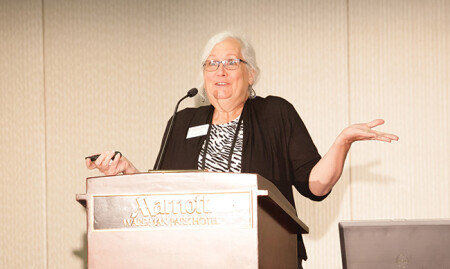Laity explore HOPE and certified ministries
By Sheila George
Special to the UMConnection

Jodi Cataldo, of Discipleship Ministries in Nashville, Tenn., delivers the keynote address during the laity session May 31.
Baltimore-Washington Conference Lay Leader Delores Martin promised a “fact-packed, real facts afternoon” during the laity session May 31. With a standing-room-only crowd paying close attention, Martin celebrated the ministry of the laity and challenged them to fulfill their rightful role.
Martin invited Jodi Cataldo, Director of Laity in Leadership at Discipleship Ministries in Nashville, to be the keynote speaker. Cataldo’s speech helped to clarify some of the new categories for lay service in the church. Her presentation outlined the roles, requirements and renewal requirements for those called to be Certified Lay Servants, Certified Lay Speakers and Certified Lay Ministers.
A Certified Lay Servant, Cataldo said, serves the local church or charge (and/or beyond) and provides program leadership, assistance
A Certified Lay Speaker serves by preaching the Word when requested by the pastor, district superintendent, or committee on lay servant ministries in accordance and compliance with ¶341.1 of The Book of Discipline. The role of a certified lay speaker is a specific calling for the ministry of pulpit supply, she said.
And a Certified Lay Minister serves as part of a ministry team with the supervision and support of a clergyperson. He or she conducts public worship, cares for the congregation, develops new faith communities, preaches the Word, leads small groups and more.
Cataldo presented the core process of discipleship as H.O.P.E. – Hospitality (reaching out and receiving new people); Offering Christ (offering opportunities to make a commitment to Christ); Purpose (growing in faith through participation in the means of grace); and Engagement (helping transform the surrounding community).
Cataldo felt her call to be a lay missionary at 10 years of age, but knew “I never felt a call to be clergy.” At one point, she lifted high a bottle of yellow-colored water, which instantly turned bright green when she added a drop of blue coloring.
“One drop transformed the whole,” she said. Cataldo noted the best way to make disciples is through our lives. “Even the smallest drops can transform the whole. So how do we transform our lives to be the drop,” she asked.
Cataldo was followed by Christine Latona, BWC regional strategist for resourcing churches. Latona, who will move into the role of Director of Connectional Ministries July 1, highlighted that it is a priority for Bishop Easterling to elevate clergy-lay partnerships in discipleship-making. One of the key areas will be advancing the NEJ Call to Acton for Racial Justice and Reconciliation.
This initiative is calling Northeastern Jurisdictional conferences to face implicit biases: when someone consciously rejects stereotypes and supports anti-discrimination efforts, but also holds negative associations in his/her mind unconsciously, she said. In this way, people literally do not know they have racial prejudices. BWC members will be encouraged to take the Implicit Attitude Test “to encourage people to do the deep work,” Latona said. The test may be taken at www.bwcumc.org/ministers/call-to-action-on racial justice.
Latona outlined some of the main strategies for dismantling racism “so we can build and be the beloved community,” she said. These initiatives include:
- naming and addressing racism personally;
- increasing awareness of systemic racism and the cultural agility of staff and leaders through relationship building, training and dialogue; and
- study and respond to the impact of structural and institutional racism.
Latona said that laity
She then introduced a panel of engaged BWC laity, representing a broad spectrum of how people are involved in making disciples for Jesus Christ.
Among the panelists:
- Raimon Jackson, a young adult;
- Melissa Lauber, BWC’s Director of Communications;
- Deaconess Jane Greys;
- Elizabeth
Stemley , president of United Methodist Women; - Bill Weller, president of United Methodist Men.
